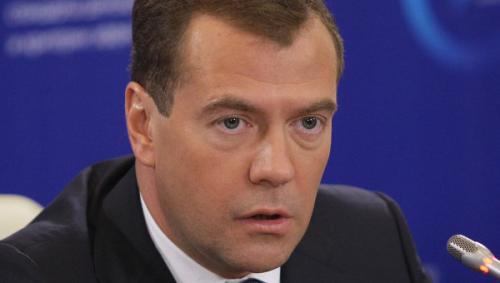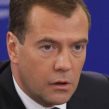
Medvedev and the Prospects for Russian-Georgian Relations
Publication: Eurasia Daily Monitor Volume: 8 Issue: 156
By:

Interviewed on the third anniversary of the Russia-Georgia war, Russian President Dmitry Medvedev took credit for the invasion orders and subsequent basing of Russian troops in Abkhazia and South Ossetia (Russia Today TV, Radio Ekho Moskvy, First Caucasus TV Channel [PIK, Tbilisi], August 5; www.kremlin.ru, August 6; Rossiyskaya Gazeta, August 8; “Medvedev Proud of Russia-Georgia War on Third Anniversary,” EDM, August 11).
In the same interview, Medvedev discussed at length the prospects of Russia-Georgia relations in the years ahead. He led a chorus of Russian officials making clear again that Moscow has not come to terms with Georgia’s independent development and Western orientation. These processes, from Moscow’s perspective, add up to “the Saakashvili regime.” Correspondingly, the goal of regime-change in Georgia involves returning the country into Russia’s orbit –a return to “normalcy” in Moscow’s eyes.
According to Medvedev, Georgia could “return to normal relations” with Russia sooner or later; and “our countries and peoples [could] restore those extremely close [ogromnyie] links that used to exist,” if and when the existing regime gives way to “another president.” Toward that goal, Medvedev seems to encourage thoughts of assassinating President Saakashvili: “People should decide his fate, either through voting or through other means, the way it sometimes happens in history.” Medvedev’s hint, the latest of this type, sounds less brazen than the Kremlin’s earlier public threats (“one well-aimed bullet,” “hanging”) against the Georgian president.
Medvedev claims that Russian forces could have overthrown the Georgian government “just like that” (finger-snapping gesture for emphasis) in August 2008, but this did not enter Russia’s plans at that time. At present, Moscow professes to treat the Georgian president as a “war criminal,” fit for the dock of an [unspecified] international court, for crimes against Russian “citizens” and “peacekeepers” in South Ossetia in 2008. Moscow even depicts President Saakashvili as a “criminal against Georgia” who caused the loss of its territories. Medvedev expatiated on all these accusations at considerable length in his interview.
This rhetoric serves a number of goals that reach beyond the Georgian president, government, or even Georgia itself. In the first place it continues the tradition of depicting as “criminal” any defense, by state or non-state actors, against Soviet or Russian forces, in any theater from Eastern Europe to Central Asia, throughout the twentieth century and recycled into the twenty-first century. It also seeks to defend Russia’s monopoly on “peacekeeping” in formerly Soviet-ruled territories, claiming that those “war crimes” targeted specifically Russia’s “peacekeeper troops” and Russian “passportized” citizens. Furthermore, “criminalizing” Georgia’s leadership is not only a sequel to the 2008 war, but also a form of general contingency planning for future conflict situations. This technique aims to brand-mark and isolate possible opponents so as to deter local and external support.
In Georgia itself, Moscow seeks to create an impression that “normalizing” relations is impossible as long as Saakashvili remains the national leader. Medvedev underscored this message in his interview: “I will never forgive him,” “I will never deal with him.” However, this overwhelming focus on Saakashvili’s person is misleading. Moscow uses his name as shorthand for Georgia’s leadership as a team. The Kremlin’s regime-change goals involve changing the team and its policies, not just the top leader.
Personalizing the issue as intensely as Moscow does, seemingly reducing it to one man, is undoubtedly meant as the first move in a desired process of “salami tactics.” Ruling out any contact with “the Saakashvili regime,” the Kremlin holds out an undefined promise of “mutually beneficial relations” with Georgia and its people, as Medvedev put it. But Russia has nothing tangible to offer, nor could Medvedev do so in his interview. His line that “Saakashvili himself” lost Abkhazia and South Ossetia in 2008 is meant to excuse Russia’s occupation of these territories.
Informal hints at reversing Moscow’s “recognition” of Abkhazia and South Ossetia might occasionally be used as playing cards in Georgia’s domestic politics. In the extra-parliamentary opposition, Nino Burjanadze suggests from time to time that Russia could reconsider its policies in these occupied territories, provided that Georgia changes its own leadership and policies. Moscow will probably encourage such speculation in the run-up to elections in Georgia.
Georgia will hold parliamentary and presidential elections in 2012-2013, and Moscow undoubtedly seeks ways to affect their outcome. Under Georgia’s constitution, Saakashvili may not run for a third term of office. The governing party, United National Movement, is likely however to win a parliamentary majority again. It can then nominate Saakashvili to serve as prime minister or parliamentary leader, unless Saakashvili chooses to withdraw from any leading role. Moscow would undoubtedly work, in Georgia and internationally, to thwart such an outcome. Russia will try casting this issue in terms of Georgia’s democratic and constitutional processes, more than in terms of personality. In fact, Moscow will attempt to use this issue in the hope of changing Georgia’s leadership and policies.




